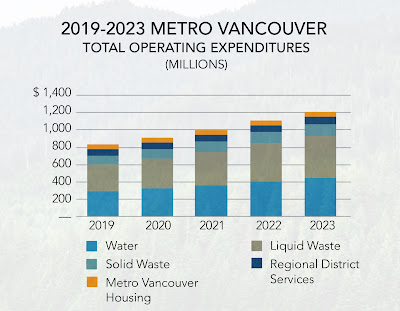Two times per year, the Metro Vancouver Regional District hosts a Council of Councils meeting. This meeting is an opportunity for all 156 elected local government representatives in Metro Vancouver to receive updates from and ask questions directly to the regional district. Municipalities in our region appoint people to sit on the Metro Vancouver Board which is where regional decisions are made. Currently, there are 40 people on the Metro Vancouver Board.
On Saturday morning, all members of Langley City council attended the Council of Councils meeting.
Some of the topics covered are summarized below.
Strategic Plan
The regional district has updated its strategic plan based on a 30-year financial outlook. This plan guides the actions of the regional district. The plan focuses on strengthening the regional federation of local governments, continuing to delivery core services (water, sewer, solid waste, affordable housing, and parks), and improving regional planning.
35,000 people moving to our region every year, plus the impacts of climate change, mean that serious investment is needed to ensure that clean drinking water is available for everyone, wastewater is properly treated, and that our natural environment continues to thrive.
More Information: http://www.metrovancouver.org/about/strategic-directions/Pages/default.aspx
5-Year Budget Outlook
Metro Vancouver Regional District services are funded directly by property tax except for water and sewer services. Water and sewer services are purchased by member municipalities who are charged a rate based on consumption. In Langley City, we use water meters to pass this charge onto property owners based on individual consumption. The City also adds the cost to maintain the local distribution system which connects individual properties to the Metro Vancouver water main. This is charged based on a flat fee plus consumption.
 |
| 5-year outlook, regional operation expenditures. Select chart to enlarge. |
 |
| 5-year outlook, regional capital expenditures. Select chart to enlarge. |
Regional water and sewer services are by far the largest regional expenditures. These costs will be increasing over the next 5 years due to the massive investment needed to adapt to the impacts of climate change, keep the system in a state of good repair, and to accommodate population growth.
One of the big projects in Langley is the $537.6 million expansion of the Northwest Langley Wastewater Treatment Plant.
More Information: http://www.metrovancouver.org/services/financial-services/programs-budget/BudgetPublications/MV2019-2023-5-YearOutlook.pdf
Regional Parks
Parkland acquisition is a priority as we need to protect the remaining green space that is currently undeveloped in our region. The 2020 regional budget proposes $7.6 million per year going forward to make this happen. The goal is to protect an additional 10% of the land in our region.
 |
| 40% of the land in our region is protected from development. 10% of the land is unprotected and undeveloped. Select chart to view. |
More information: http://www.metrovancouver.org/services/parks/ParksPublications/RegionalParksLandAcquisition2050.pdf
Metro Vancouver Housing
The regional district is the second largest affordable housing provider after BC Housing in Metro Vancouver. 9,400 tenants living in Metro Vancouver Regional District Housing. There is an affordable housing crisis in our region.
To help respond to this crisis, the regional district is upping its housing budget by $4 million per year to build at least 500 new units of affordable housing. We were told at the meeting that this number could grow to 1,500 new units with partnerships likely to come from the feds and province.
Air Quality and Climate Change
Metro Vancouver is responsible for regulating air quality from stationary emitters such as factories, plus off-road vehicle emissions such as construction equipment. The regional district also provides statistics and advice to municipalities to reduce emissions and mitigate the impacts of climate change.
More information: http://www.metrovancouver.org/climate2050

No comments:
Post a Comment